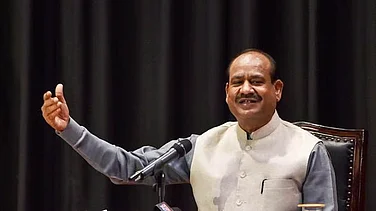I'm not a politician and my other habits are good.
Artemus Ward, Fourth of July Oration.
PEFFECT credentials for the office of the president of India, the highest office of state of the republic. And words that Kocheril Raman Narayanan, at 76 and at the threshold of his career's pinnacle, can easily claim for himself without opposition. Despite the fact that he has thrice been elected to the Lok Sabha (1984,'89 and '91) from Kerala on a Congress ticket and was a minister in the Rajiv Gandhi-led government for five years before his elevation to vice-president in 1992. He has been that sort of a politician.
But what sort of a president will he make? Scholar, diplomat, journalist; pupil of Harold Laski, protege of Nehru, Narayanan has had many avatars. Nearly as many as the adjectives used liberally to describe him--erudite, sophisticated, learned, unassuming. He has come a long way for a man who missed the boat, quite literally, when he was starting out in life. He was in his mid-twenties and having "pulled himself up from his bootstraps" when Margaret Thatcher was but a slip of a girl in ponytails, he arrived in Bombay in 1945 armed with an MA ("First Class First") in English Literature from the University of Travancore looking for a passage to England.
"In those days bright students from poor backgrounds such as Narayanan depended on getting to Britain for higher studies on a students' loan (repayable after seven years) the Tatas would sanction after a rigorous written test and interview. This would include the fare for the sea passage from Bombay. By the time Narayanan's loan to study at the London School o! Economics came through, the ship had already left," recalls senior journalist Nikhil Chakravartty who has known Narayanan for many years. But a temporarily dejected 'KRN' found employment as a journalist with the Times of India, thanks to the Tata bosses who were impressed by the young man. He did manage to board the next ship in 1946.
Fifty years on, this "creation of circumstances", as he once referred to himself in an interview, is everybody's man for president. Witness the consensus among the ruling United Front coalition and the Congress, which together comprise around 70 per cent of the electoral college. The BJP, too, announced its support for a man will be India's first Harijan president. Narayanan's relief was visible. The vice-president's aides say his instinct is for consensus; the phonecall to A.B. Vajpayee even after the UF-Congress rooted for him is testimony. This from a man who is strongly endorsed by Left parties. Few leaders would get away with something like this.
According to Vayalar Ravi, Kerala Congress chief and long-time associate of the vice-president, "that is the man in a nutshell". But it is because of his unimpeachable integrity, commitment and stature as an intellectual that he is acceptable to all, adds Ravi. "Remember that he has handled explosive situations as vice-chancellor of Jawaharlal Nehru University, when it was at its glorious and militant best, with calmness and sagacity. And he has overseen the conduct of a Rajya Sabha in which no single party is dominant for the past five years, without antagonising any section. These are the qualities he will bring to his tenure as president and they will serve him well. His concern for the poor, though, will be reflected in the presidential agenda."
As Narayanan prepares for the top seat, many tales, some apocryphal, are doing the rounds. He met his Burmese wife when he was on a diplomatic assignment to that country. But even after their marriage, foreign service rules meant Usha found it difficult to get to India. Narayanan waited a while before he despatched an epistle to Nehru saying he be allowed to "consummate" his marriage. Panditji came to their rescue and the couple hasn't looked back.
FORMER Kerala chief minister A.K. Antony says "Narayanan is what an increasingly fragmented society and polarised polity needs today--a balancing force. In the 50th year of Independence there can be no better representative of our nation than a man who has reached where he is on his own merit." K. Karunakaran, another former chief minister, feels that "above all, Narayanan will be non-partisan. That is why even when he has to take difficult decisions they will be accepted by all. In a party political sense, despite being elected on a Congress ticket three times, he cannot be classified as a Congressman."
But even as those-who-matter rejoice in the "Right Choice" (two major national dallies used the same headline for their lead edits the day after Narayanan's candidature was announced), cynics point out that the vice-president, for all his expertise and learning, belongs to the "right caste". And commentators have been critical of the Ram Vilas Paswans and G. Venkatasamys of Indian politics for "harping on Narayanan's Scheduled Caste origins instead of concentrating on his stature". "How can you disguise caste in India?" is Antony's riposte.
In the complicated world of caste politics, using Narayanan, however much he resents it, is obviously fair game for some. But neither the man nor his life lends itself to the sloganeering school of politics whose proponents have taken over the discourse. His concern for the poor is an abiding one. But it is also a secular one. Yet, Narayanan felt in 1992 that "it is the strong desire for social justice dormant within our system" which led to his unanimous election as vice-president, rather than his individual qualities. An acceptance of reality, perhaps, but then Narayanan has always been far too modest.
In the words of CPI(M) politburo member Prakash Karat whose party was Narayanan's main rival in all three elections he contested and won: "His personal transcends political and caste affiliations." The resultant imagery is very, very powerful: a representative of Mahatma Gandhi's Children of God as the nation's president in the 50th year of Independence. Symbols are important. And symbols with substance, ideal.



















.png?w=200&auto=format%2Ccompress&fit=max)






